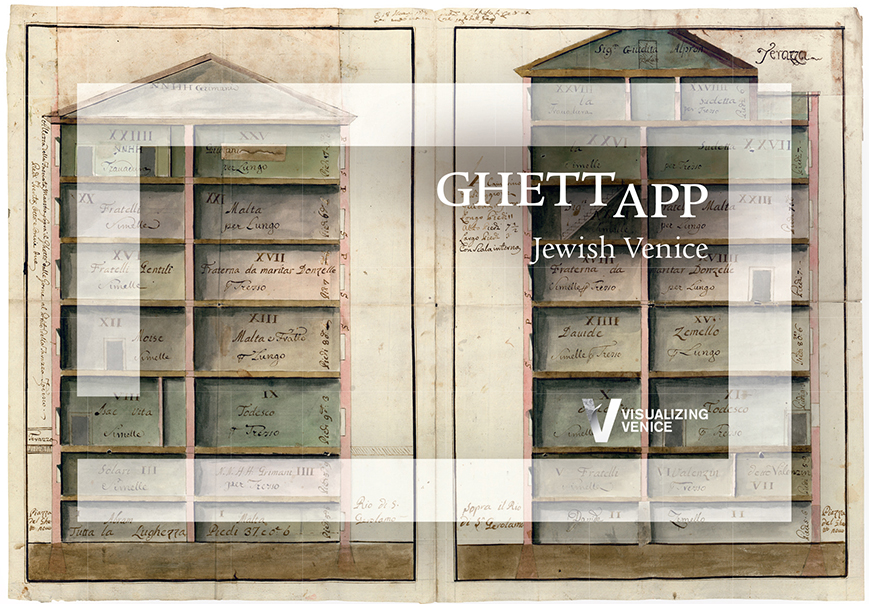
An integrated information management system for consistent historic narratives and visualizations. Ghett/APP for the Venetian Ghetto
Abstract
Keywords
References
Azuma, R. T. (1997). A Survey of Augmented Reality, 355–385.
Baggio, R., Sigala, M., Inversini, A., Pesonen, J., & Eds. (2013). Information and Communication Technologies in Tourism 2014. eProceedings of the ENTER 2014 PhD Workshop, (July 2013), 1–146. http://doi.org/10.1007/978-3-319-03973-2
Barry, A. (2006). Creating a virtuous circle between a museum’s on-line and physical spaces.
Battini, C., & Landi, G. (2015). 3D Tracking Based Augmented Reality for Cultural Heritage Data Management. 3D-Arch 2015 - 3D Virtual Reconstruction and Visualization of Complex Architectures, 40–5(W4), 375–379. http://doi.org/10.5194/isprsarchives-XL-5-W4-375-2015
Benyon, D., Quigley, A., O’Keefe, B., & Riva, G. (2014). Presence and digital tourism. AI and Society, 29(4), 521–529. http://doi.org/10.1007/s00146-013-0493-8
Bergamo, F. (2013). Verso un’estetica ecologica per il design dell’interazione, 1–142.
Bødker, M., & Browning, D. (2013). Tourism sociabilities and place: Challenges and Opportunities for design. International Journal of Design, 7(2), 19–30.
Bonsma, P., Bonsma, I., Ziri, A. E., Parenti, S., Lerones, P. M., Hernández, J. L., … Iadanza, E. (2016). INCEPTION Standard for Heritage BIM Models. In M. Ioannides, E. Fink, A. Moropoulou, M. Hagedorn-Saupe, A. Fresa, G. Liestøl, P. Grussenmeyer (Eds.), Digital Heritage. Progress in Cultural Heritage: Documentation, Preservation, and Protection: 6th International Conference, EuroMed 2016, Nicosia, Cyprus, October 31 -- November 5, 2016, Proceedings, Part I (pp. 590–599). Cham: Springer International Publishing. http://doi.org/10.1007/978-3-319-48496-9_47
Brogni, B. A., Avizzano, C. A., Evangelista, C., & Bergamasco, M. (1999). Technological approach for cultural heritage: augmented reality. In 8th IEEE International Workshop on Robot and Human Interaction. RO-MAN ’99 (Cat. No.99TH8483) (pp. 206–212). IEEE. http://doi.org/10.1109/ROMAN.1999.900341
Burdick, A., Drucker, J., Lunenfeld, P., Presner, T., & Schnapp, J. (2012). Digital Humanities. http://doi.org/10.1108/S2044-9968(2013)0000007006
Burdick, A., & Willis, H. (2011). Digital learning, digital scholarship and design thinking. Design Studies, 32(6), 546–556. http://doi.org/10.1016/j.destud.2011.07.005
Caraceni, S. (2014, April 30). Comparison between virtual museums. SCIRES-IT - SCIentific RESearch and Information Technology. http://doi.org/10.2423/i22394303v4n1p51
Dickinson, J. E., Ghali, K., Cherrett, T., Speed, C., Davies, N., & Norgate, S. (2014). Tourism and the smartphone app: capabilities, emerging practice and scope in the travel domain, 17, 84–101.
Dourish, P. (2001). A History of Interaction. Where the Action Is, 1–23.
Einsfeld, K., Ebert, A., Kerren, A., & Deller, M. (2009). Knowledge generation through human-centered information visualization. Information Visualization, 8(3), 180–196. http://doi.org/10.1057/ivs.2009.15
Empler, T. (2015). APP design con uso della realtà aumentata per la divulgazione dei Beni Culturali. Disegnare Idee Immagini, (50), 60–69.
Empler, T. (2014). Tecnologie dell’informazione e della comunicazione (TIC) nella divulgazione dei Beni Culturali. La Galleria prospettica di Palazzo Spada. In G. M. Valenti (Ed.), Prospettive architettoniche conservazione digitale, divulgazione e studio (pp. 887–916). Roma: Sapienza Univesrità Editrice.
Falvo, P. G., & D’Annibale, E. (2016, August 4). A virtual itinerary for a real experience. The Frescoes of the Chapel of the Magi in Palazzo Medici riccardi, Florence. SCIRES-IT - SCIentific RESearch and Information Technology. http://doi.org/10.2423/i22394303v6n1p41
Fassi, F., Mandelli, A., Teruggi, S., Rechichi, F., Fiorillo, F., & Achille, C. (2016). VR for Cultural Heritage. In Third International Conference, AVR 2016 Lecce, Italy, June 15–18, 2016 (pp. 139–157).
Fischman, G. E. (2001). Reflections about Images, Visual Culture, and Educational Research. Educational Researcher, 30, 28–33. http://doi.org/10.3102/0013189X030008028
Garau, C. (2014). From Territory to Smartphone: Smart Fruition of Cultural Heritage for Dynamic Tourism Development from Territory to Smartphone: Smart Fruition of Cultural Heritage for Dynamic Tourism Development. Planning Practice & Research. Taylor & Francis. http://doi.org/10.1080/02697459.2014.929837
Huang, W., Alem, L., & Livingston, M. A. (2013). Human Factors in Augmented reality environments. http://doi.org/10.1007/978-1-4614-4205-9
Jurjen Caarls, Jonker, P., Kolstee, Y., Rotteveel, J., Eck, W. van, Caarls, J., … Eck, W. van. (2009). Augmented Reality for Art, Design and Cultural Heritage: System Design and Evaluation. Journal of Image Video Process., 2009, 5:2--5:2. http://doi.org/10.1155/2009/716160
Kennedy-Eden, H., & Gretzel, U. (2012). A taxonomy of mobile applications in tourism. E-Review of Tourism Research, 10(2), 47–50.
Lerario, A., & Maiellaro, N. (2014). Mappe interattive per la promozione turistico-culturale. SCIRES-IT - SCIentific RESearch and Information Technology. http://doi.org/10.2423/i22394303v4n1p85
Marcus, A. (2014). Design, User Experience and Usability. (A. Marcus, Ed.) Springer (Vol. 8518). Cham: Springer International Publishing. http://doi.org/10.1007/978-3-642-39241-2
Mason, M. (2015). Prototyping practices supporting interdisciplinary collaboration in digital media design for museums. International Journal of Museum Management and Curatorship, 30(5), 394–426. http://doi.org/10.1080/09647775.2015.1086667
Mason, M. (2013). The dimensions of the mobile visitor experience: Thinking beyond the technology design. The International Journal of the Inclusive Museum, 5, 51–72.
Milgram, P., & Kishino, F. (1994). A taxonomy of mixed reality visual displays. IEICE TRANSACTIONS on Information and Systems, 77(12), 1321–1329.
Pendit, U. C., Aida, J., & Bakar, A. (2014). Mobile Augmented Reality for Enjoyable Informal Learning in Cultural Heritage Site. Internation Journal of Computer Applications, 92(14), 19–26.
Pendit, U. C., Zaibon, S. B., & Bakar, J. A. A. (2016). Measuring enjoyable informal learning using augmented reality at cultural heritage site, 20087, 20087. http://doi.org/10.1063/1.4960927
Souto, V. T., Cristo, C., Araújo, M. G., & Santos, L. (2015). Designing Apps for Tourists: A Case Study. In 4th International Conference, DUXU 2015 Held as Part of HCI International 2015 Los Angeles, CA, USA, August 2–7, 2015, (Vol. III, pp. 425–436). http://doi.org/10.1007/978-3-319-20889-3
Tommaso, L., & Paolis, D. (2012). Applicazione Interattiva Di Realtà Aumentata Per I Beni Culturali, 2(1), 121–132. http://doi.org/10.2423/i22394303v2n1p121
Wong, L. H., Milrad, M., & Specht, M. (2015). Seamless learning in the age of mobile connectivity. Seamless Learning in the Age of Mobile Connectivity. http://doi.org/10.1007/978-981-287-113-8
Refbacks
- There are currently no refbacks.
Copyright (c) 2017
DISEGNARECON
ISSN 1828 5961
Registration at L'Aquila Law Court no 3/15 on 29th June, 2015.
Indexed in SCOPUS. Diamond Open Access. All papers are subjected to double blind peer review process by qualified reviewers.
Journal founded by Roberto Mingucci
